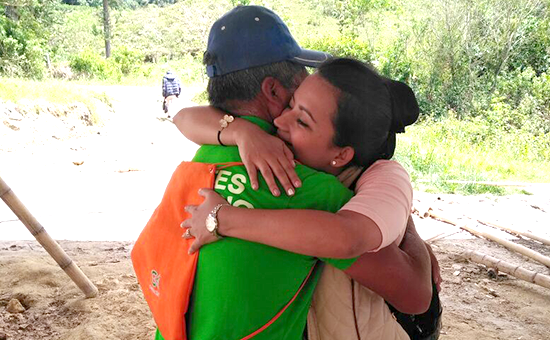
15 Mar Who Provides Care for the Caregivers?

Aura Toro Fince is a Regional Social Services Specialist for HRH2030 Colombia. A social worker with a specialty in public management and a master’s degree in human resources management from the Rafael Belloso Chacín University in Venezuela, she has 20 years of experience in caring for infants, children, adolescents, families, and communities in emergency and development contexts.
Accompanying individuals and families in adversity requires sensitive, committed, trained, and empowered professionals who can provide social support. Social workers are caregivers who are trained to understand the “ethics of care”—the concept that we form a network of relationships of responsibility for and dependence between members of society, a commitment to others and to social justice. We give and receive, we care, and we must be cared for. This idea is reflected in the theme of this year’s World Social Work Day—Ubuntu, I am because we are—which focuses on connection and social solidarity.
But who cares for the caregivers? Or more specifically, who cares for social workers?
It is paradoxical to realize that we social workers dedicate our lives to caring for others, but generally the care is not reciprocal. Unfortunately, as a result, our physical and mental health can be seriously affected. It is worrying that in the social work sector, where we see a great effort to provide care for others, caring for ourselves is not a priority. We must broaden the focus of caring for others to caring for ourselves, and this includes thinking about self-care and accepting care reciprocity as a need rather than a weakness.
We also need to make a call for governments to see social workers not only as executors of social policies, but also as beneficiaries of these same policies, and to cover all our needs to empower us as professionals. Supporting social workers, however, is not just the responsibility of governments, but everyone’s responsibility. An example of an organization taking the lead on this is the World Health Organization, which declared 2021 as the International Year of Health and Care Workers. With their call to “Protect. Invest. Together,” they are advocating for increased investment in terms of economic, professional, social, and other support, , for workers in the health and social services sector. This includes developing strategies that promote our mental health and our care to avoid burnout, demotivation, and exhaustion.
In Colombia, as part of USAID’s Human Resources for Health in 2030 (HRH2030) program, we work with the Colombian Institute of Family Welfare (ICBF) to strengthen the social service workforce at the national and local levels, with the aim of guaranteeing better protection and increased well-being for children, adolescents, and families. We do this by increasing effective intersectoral and interagency coordination and improving the quality and coverage of service delivery by training social workers in hard and soft skills. A better skillset and better relationships and coordination with colleagues can help to reduce the stress generated by the high workload. Less stress is a way to take care of the physical and mental health of social workers.
This World Social Work Day, I share the words the author and professor Leo Buscaglia, “Sometimes we underestimate the power of the word, of the caress, a smile, an attentive ear, a compliment or the slightest act of caring, all of which have the potential to change a life.” This is what we caregivers do: change lives. My goal as a social worker—in addition to accompanying those who are facing adversity—is this: to create spaces in which we social workers can reflect on the things we need to do our jobs well while also caring for ourselves, and act together to bolster the social service workforce and increase recognition of its value.
Social workers do so much to guarantee our well-being and the well-being of our families and children, let’s act for their well-being too. Let us all advocate for and work together to increase investments in social workers, to tend for their needs, and to make providing care a reciprocal process. Let us start thinking about ways to care for those who care for us.
Photo: A social worker (in white) hugs a man (in green) from Pitalito, a rural community in Huila, Colombia, during a workshop hosted by HRH2030 with ICBF and members of the community. Credit: HRH2030 Colombia





